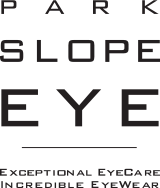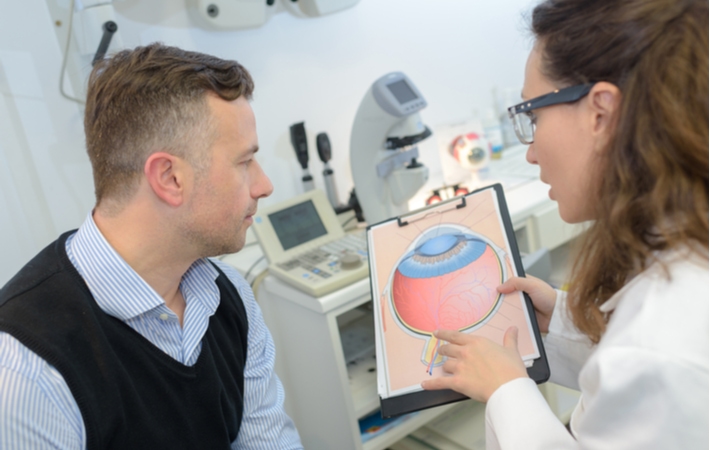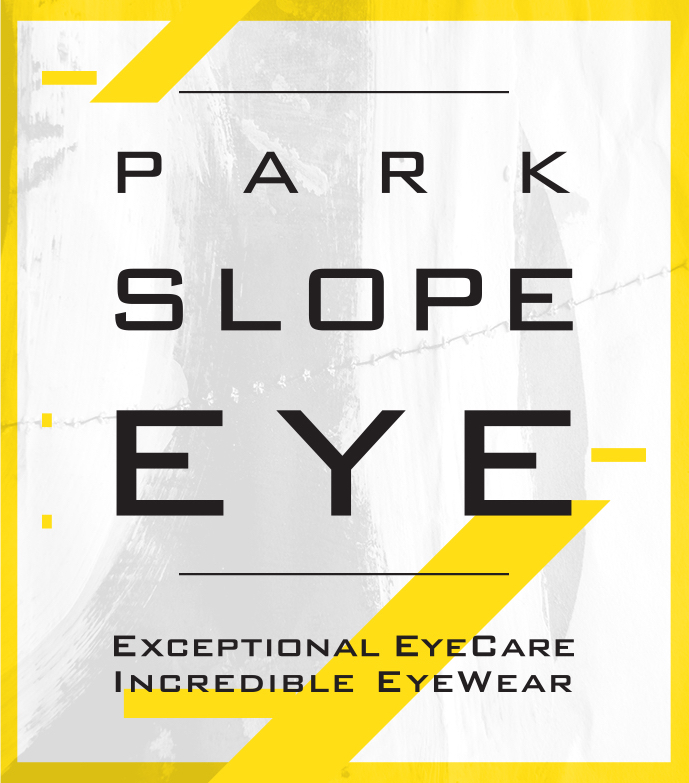Glaucoma can affect anyone, but some may be at more risk. High-risk individuals should receive an eye exam to determine their eye health, and understanding your risk can help you know if you should see your optometrist.
Is this glaucoma hereditary? Continue reading to learn more about this condition, including what factors may put you at more risk of developing glaucoma.
What Is Glaucoma?
Glaucoma is a group of eye conditions that damage the optic nerve. Many types of glaucoma cause a buildup of pressure in your eye, known as your intraocular pressure (IOP). Your optic nerve is critical for good vision, and you can experience vision loss if it sustains damage.
Glaucoma is one of the leading causes of vision loss in older adults, but this condition can develop at any age. This vision loss is permanent, so it’s important to catch glaucoma as early as possible. However, many forms of glaucoma develop with little to no symptoms until vision loss occurs.
Symptoms of Glaucoma
Symptoms depend on the type of glaucoma you’re experiencing and its stage of development. Glaucoma usually develops gradually, and you may not notice any issues until your vision is affected.
Glaucoma is the sneak thief of sight; it can go undetected for years because someone has no visible issues and skips their annual eye exams.
As glaucoma progresses, you may notice:
- Blind spots in your peripheral or central vision
- Tunnel vision (in advanced stages)
Other symptoms of glaucoma relate to a specific form of this condition known as angle-closure glaucoma. This condition requires medical attention, so seek treatment if you experience any symptoms, including:
- Severe headache
- Eye pain
- Nausea & vomiting
- Blurred vision
- Halos around lights
- Eye redness
Because of glaucoma’s typically slow progression, you may not even know you have this condition until advanced stages. Many people assume that if they have glaucoma, they’ll notice increased eye pressure or have difficulty seeing, but this isn’t the case. Regular visits with your optometrist are the best way to help identify symptoms of this disease.
Anyone can develop glaucoma, but are you more at risk if you have a family history of this condition?
Is Glaucoma Hereditary?
While everyone can develop glaucoma, you may be at a higher risk if it runs in your family. The most common form of glaucoma, open-angle glaucoma, is hereditary.
Your risk of this condition is 4 to 9 times higher if your immediate family has glaucoma. You aren’t guaranteed to develop this condition, but you should be aware of this increased risk. Regular visits with your optometrist can help protect your vision.
Besides family history, several other factors can increase your risk of glaucoma.
Glaucoma Risk Factors
Your risk of developing glaucoma depends on several variables. You may be at higher risk of glaucoma depending on:
- Race
- Age
- Family history
- Steroid use
- Previous eye injury
- High myopia
- Hypertension
- Central corneal thickness
What Causes Glaucoma?
The main reason this condition occurs is because of optic nerve damage. Many, but not all forms of glaucoma include an increase in IOP, which affects your optic nerve.
Your eye pressure increases due to fluid buildup inside of your eye. This fluid drains through an angle where your iris and cornea meet, but complications can affect this drainage. You may produce more fluid than normal, or issues can develop in your drainage system.
The cause of your optic nerve damage can depend on the form of glaucoma you’re experiencing.
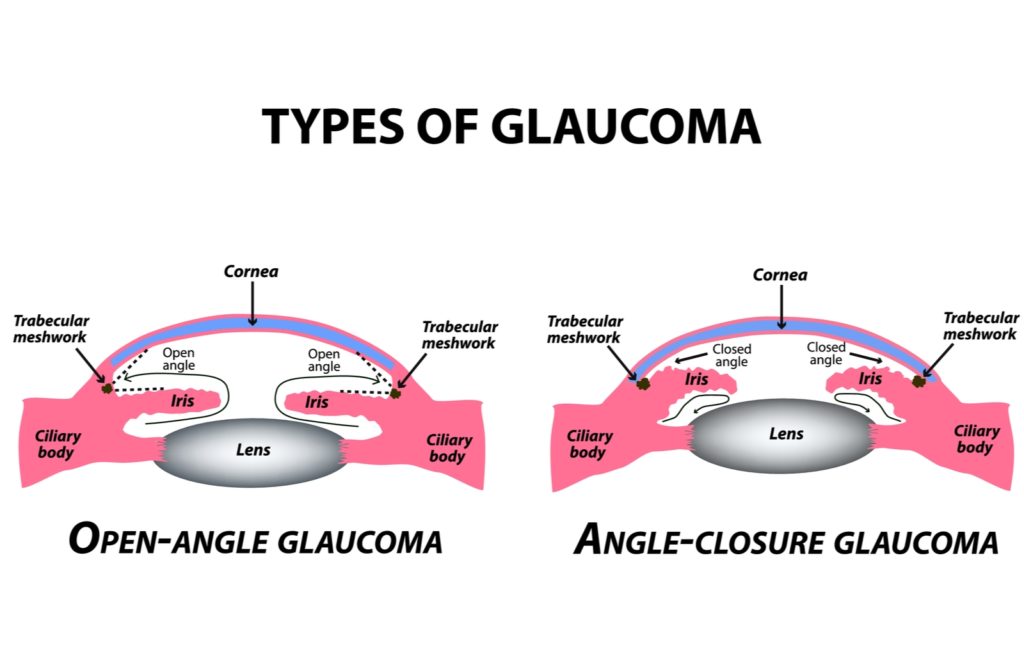
Types of Glaucoma
There are several types of glaucoma you can develop, and each can affect you differently. All forms of glaucoma can develop silently for years until your vision is affected. Some of the most common forms of this disease include:
- Open-angle glaucoma
- Angle-closure glaucoma
- Normal-tension glaucoma
Open-Angle Glaucoma
Approximately 3 million Americans have open-angle glaucoma. This form of glaucoma develops when fluid cannot drain from your eye effectively.
This drainage issue leads to an increase in eye pressure. As this pressure rises, your optic nerve is affected, and you can begin to lose your vision.
This condition has no early symptoms, so you may not notice anything is wrong until vision loss occurs. You may experience blind patches or tunnel vision in advanced stages.
Angle-Closure Glaucoma
Angle-closure glaucoma can be a significant risk to your vision. This condition occurs when your iris is not as wide or open as it should be, causing the blockage of your drainage canals. This blockage causes fluid to build, increasing pressure within your eye.
This condition can happen gradually or rapidly. Its symptoms include:
- Severe headache
- Eye pain
- Nausea & vomiting
- Blurred vision
- Halos around lights
- Eye redness
Visit your optometrist immediately if you experience any of these symptoms.
Normal-Tension Glaucoma
Normal-tension glaucoma is different from other forms of this disease because it doesn’t increase eye pressure; your IOP stays consistent or low.
Professionals are still unsure why normal-tension glaucoma develops, but your eye doctor can detect this condition by examining the optic nerve. Your optometrist can then recommend treatments to help manage this disease.
Glaucoma Treatment
Your optometrist can recommend treatments to help manage glaucoma after diagnosing this condition. Damage from glaucoma is permanent, but your optometrist can help protect your eyes from further vision loss.
Some potential treatments include:
- Prescription eye drops
- Oral medications
- Surgery
Your eye doctor can recommend the most effective treatments for your needs based on your condition’s severity.
Glaucoma can significantly impact your vision, but you can manage this condition with help from your optometrist. Regular eye examinations are vital for helping identify any early signs of glaucoma, protecting your vision. Remember that glaucoma is the sneak thief of sight, don’t let it steal your vision; visit your optometrist for an annual eye exam. If you’re experiencing symptoms of glaucoma or need an eye exam, book an appointment.
